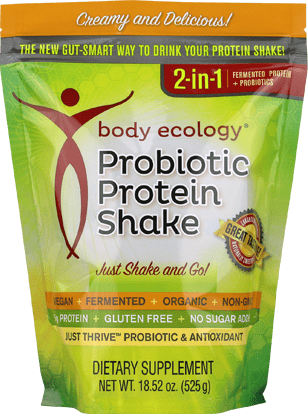Vegan Protein Shakes: Why Fermented Grain-Like Seeds Are the Answer
Traditionally, when you eat beans or lentils, you eat rice too. This classic combination in the culinary world is no accident. Grains and legumes are paired together because your body needs specific amino acids. These essential amino acids must all show up in your digestive tract at the same time. Otherwise, they aren’t able to do their job.

A complete vegan protein may be hard to find, until you add Body Ecology grain-like seeds to your diet. The tasty new Body Ecology Immune Power Protein Shake is made with these hardy seeds and is 100 percent fermented for the maximum bioavailability of nutrients.
This is another great example of the Principle of Uniqueness as it will vary for each person and each type of protein consumed. All proteins have a certain amount of time they stay in the system. That can range from 30 minutes, 2 hours, 4 hours, or more based on what foods are consumed. The fiber, density of food, enzymes, and how we are digesting the food all factor in to this window of time. Most protein found in food is not very well utilized by the body (even in someone with perfect digestion). Most people do not even realize they are protein-malnourished and that protein is so important to digestion, detoxification, hormones, and more.
A “complete protein” that is also fermented makes it much more usable by the body. That means this protein will nourish your cells and heal your gut, unlike most proteins. In addition to nourishing your body, it will be much less taxing on your system.
Which Vegan Proteins Are Complete?
Amino acids are the smaller building blocks of proteins. A complete protein means that you’ve got all of your essential amino acids in just the right amounts. Unfortunately, complete proteins in the plant kingdom are hard to come by. Which is why the grain-legume combo works so well — because they fill in each other’s nutritional gaps.
There are a few plant proteins that are complete. These include the grain-like seeds featured in the Body Ecology Diet:
- Amaranth
- Buckwheat
- Quinoa
Unlike common grains, the Body Ecology seeds contain very little storage proteins (otherwise known as prolamin proteins), which are toxic to those with celiac disease.1,2
The proteins in Body Ecology seeds are so close to the quality of animal proteins that they are even more bioavailable than their whole grain cousins — before fermentation! After you ferment amaranth, buckwheat, and quinoa, they are in their most bio-absorptive and easy-to-use state. Fermented Body Ecology seeds are also free of harmful anti-nutrients that bind to minerals, like phytate.
Rebuild Your Gut and Lose Weight
Besides protein, grain-like seeds are uncommonly rich in vitamins, minerals, and fiber. For example:
- Quinoa is an excellent source of folate, a nutrient that can run low in those who follow a plant-based diet.3
- Quinoa and amaranth are good sources of calcium, which is especially important if you’re on Phase 1 of the Body Ecology Diet and have removed dairy while your intestinal tract heals.
The long list of nutrients in quinoa and amaranth is exactly why they are featured in Body Ecology’s new Immune Power Protein Shake. And to ensure that our Protein Blend is easy to digest, we ferment organic amaranth and quinoa along with pea protein concentrate and a handful of organic, medicinal mushrooms.
Our pea protein concentrate is made from pea flour. We have painstakingly removed the protein from the starch. What you’re left with is a protein-rich concentrate that’s 47 percent protein, which is twice as much as what you’ll find in unprocessed peas.4
Mushrooms — like Reishi and Agaricus — are notoriously good at stimulating the immune system, assisting in fighting tumors, and reducing inflammation.5,6
However, a recent study reveals that there may be even more reasons to include medicinal mushrooms in your diet — they nourish a healthy inner ecosystem while helping you to shed excess weight.7 John Young at Rockefeller University explains:
“Although the link between obesity and the gut microbiota is well established, our work is among the first to show that a traditional Chinese medicine can be used as a prebiotic to lose weight.”8
Besides encouraging weight loss, prebiotic mushrooms like Reishi also reverse the damage of a devastated inner ecosystem, strengthen your intestinal barrier, and reduce metabolic markers linked to leaky gut.
Alkalize and Control Blood Sugar with Hebridean Sea Kelp
Body Ecology’s Immune Power Protein Shake includes Hebridean Sea Kelp, which helps you feel satisfied and full after a meal.9
Brown algae — like Hebredian Sea Kelp — also contains fucoidan. Fucoidan helps to control blood sugar because it inhibits the enzymes that break starch into smaller sugar molecules. Fucoidan slows down the absorption of sugar into your bloodstream. It works just enough to protect you from sugar overload. This is especially important if you are insulin resistant and have trouble moving sugar into your cells.10
All alkalizing sea vegetables contain large amounts of fiber, which act as a prebiotic and feed your good bacteria in your gut. Fiber can also slow down digestion, helping to decrease cholesterol and — once again — protect against blood sugar spikes.11
Pick Up Body Ecology’s New Fermented Vegan Protein Shake Today
Body Ecology’s Immune Power Protein Shake has been carefully designed to nourish your cells and repair your gut while following the principles of the Body Ecology Diet. Because the foods in our protein shake are fermented, they are 100 percent bioavailable and easy for your body to use.
The fermented grain-like seeds in our Protein Blend are free of harsh anti-nutrients that rob the body of precious minerals like iron, calcium, and magnesium. Each element of our Immune Power Protein Shake has been selected to feed healthy gut bacteria and strengthen the intestinal wall.
Oh, and did we mention it tastes incredible?
What To Remember Most About This Article:
Rice and beans is a common dietary staple because it provides the body with all the essential amino acids to form a complete protein. Beyond this grain-and-legume combo, a complete plant-based protein can be hard to find.
Fortunately, Body Ecology grain-like seeds like buckwheat, amaranth, and quinoa fit the bill, providing a complete source of plant protein that is even more nutritious and bioavailable when fermented. Fermenting these nourishing seeds also removes harmful anti-nutrients that can bind to essential minerals and strip food of its nutritional value.
Body Ecology’s new Immune Power Protein Shake not only tastes great — it features fermented grain-like seeds (organic amaranth and quinoa), along with pea protein concentrate and medicinal mushrooms, for this very reason. Available in Chocolate, the Body Ecology Immune Power Protein Shake has been specially designed to keep the taste buds entertained while fueling the body and healing the gut with 100 percent fermented and bioavailable plant-based proteins.
- [product id=”202″]
REFERENCES:
- Drzewiecki, J., Delgado-Licon, E., Haruenkit, R., Pawelzik, E., Martin-Belloso, O., Park, Y. S., … & Gorinstein, S. (2003). Identification and differences of total proteins and their soluble fractions in some pseudocereals based on electrophoretic patterns. Journal of agricultural and food chemistry, 51(26), 7798-7804.
- Gorinstein, S., Pawelzik, E., Delgado‐Licon, E., Haruenkit, R., Weisz, M., & Trakhtenberg, S. (2002). Characterisation of pseudocereal and cereal proteins by protein and amino acid analyses. Journal of the Science of Food and Agriculture, 82(8), 886-891.
- Allen, L. H. (2008). Causes of vitamin B12 and folate deficiency. Food & Nutrition Bulletin, 29(Supplement 1), 20-34.
- Sosulski, F. W., & McCurdy, A. R. (1987). Functionality of flours, protein fractions and isolates from field peas and faba bean. Journal of Food Science, 52(4), 1010-1014.
- Gonzaga, M. L., Menezes, T. M., Rebêlo, L. M., de Souza, J. R., Ricardo, N. M., & Soares, S. D. A. (2014). Agaricus brasiliensis mushroom betaglucans solutions: Physicochemical properties and griseofulvin solubilization by self-assembly micro-nano particles formation. Bioactive Carbohydrates and Dietary Fibre, 4(2), 144-154.
- Wang, X. C., Xi, R. J., Li, Y., Wang, D. M., & Yao, Y. J. (2012). The species identity of the widely cultivated Ganoderma,‘G. lucidum’(Ling-zhi). PLoS ONE, 7(7), e40857.
- Chang, C. J., Lin, C. S., Lu, C. C., Martel, J., Ko, Y. F., Ojcius, D. M., … & Lai, H. C. (2015). Ganoderma lucidum reduces obesity in mice by modulating the composition of the gut microbiota. Nature Communications, 6.
- Holmes, D. (2015). Obesity: Medicinal mushroom reduces obesity by modulating microbiota. Nature Reviews Endocrinology.
- Mabeau, S., & Fleurence, J. (1993). Seaweed in food products: biochemical and nutritional aspects. Trends in Food Science & Technology, 4(4), 103-107.
- Kim, K. T., Rioux, L. E., & Turgeon, S. L. (2014). Alpha-amylase and alpha-glucosidase inhibition is differentially modulated by fucoidan obtained from Fucus vesiculosus and Ascophyllum nodosum. Phytochemistry, 98, 27-33.
- Hall, A. C., Fairclough, A. C., Mahadevan, K., & Paxman, J. R. (2012). Ascophyllum nodosum enriched bread reduces subsequent energy intake with no effect on post-prandial glucose and cholesterol in healthy, overweight males. A pilot study. Appetite, 58(1), 379-386.









